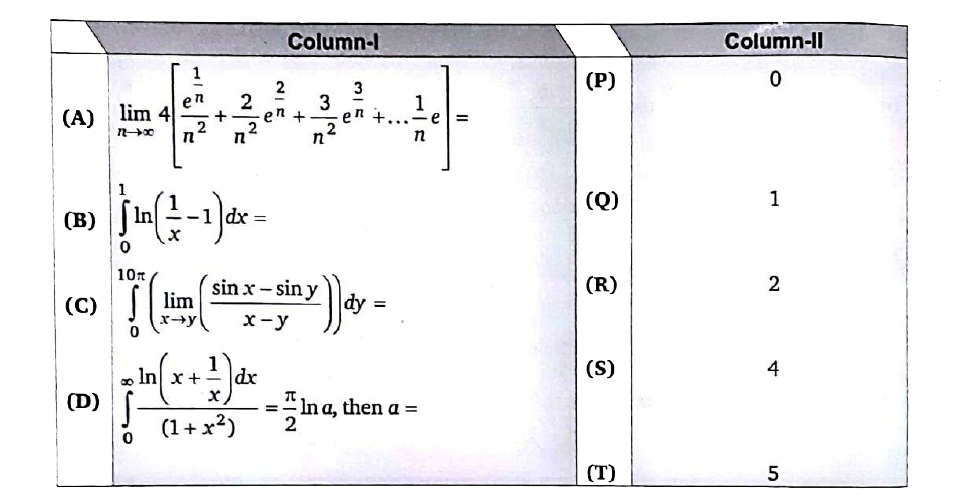If f(x),g(x),h(x)andϕ(x) are polynomial in x, (∫x1f(x)h(x)dx)(∫x1g(x)ϕ(x)dx)−(∫x1g(x)h(x)dx) is divisible by (x−1)2. Find maximum value of λ.
The correct Answer is:4
Step by step video, text & image solution for If f(x),g(x),h(x) and phi(x) are polynomial in x, (int_1^x f(x) h(x) dx) (int_1^x g(x) phi(x) dx) - (int_1^x g(x) h(x) dx) is divisible by (x-1)^2. Find maximum value of lambda. by Maths experts to help you in doubts & scoring excellent marks in Class 12 exams.
Updated on:21/07/2023Topper's Solved these Questions
- INDEFINITE AND DEFINITE INTEGRATIONBOOK - VK JAISWALCHAPTER - INDEFINITE AND DEFINITE INTEGRATIONEXERCISE - EXERCISE (MATCHING TYPE PROBLEMS)
5 Videos
- HYPERBOLABOOK - VK JAISWALCHAPTER - HYPERBOLAEXERCISE - Exercise-4 : Subjective Type Problems
3 Videos
- INVERSE TRIGONOMETRIC FUNTIONS BOOK - VK JAISWALCHAPTER - INVERSE TRIGONOMETRIC FUNTIONS EXERCISE - Exercise-5 : Subjective Type Problems
6 Videos
Similar Questions

View SolutionLet y=mx+c be a common tangent to x216−y29=1andx24+y23=1, then find the value of m2+c2.
View SolutionThe complete set of values of x satisfying the inequality sin−1(sin5)>x2−4x is (2−√λ−2π,2+√λ−2π), then λ=
View SolutionIf f(x),g(x),h(x) and phi(x) are polynomial in x ,(int_(1)^(x)f(x)h(x)dx)(int_(1)^(x)g(x)phi(x)dx)-(int_(1)^(x)g(x)h(x)dx) is divisible by (x-1)^(2). Find maximum value of lambda
View SolutionIf f(x), g(x), h(x) are polynomials of three degree, then phi(x)=|(f'(x),g'(x),h'(x)), (f''(x),g''(x),h''(x)), (f'''(x),g'''(x),h'''(x))| is a polynomial of degree (where f^n (x) represents nth derivative of f(x))
View SolutionProve that ϕ(x)=∣∣ ∣ ∣∣f(x)g(x)h(x)f'(x)g'(x)h'(x)f''(x)g''(x)h''(x)∣∣ ∣ ∣∣ is a constant polynomial.
View SolutionThe value of ∫21{f(g(x))}−1f'(g(x))g'(x) dx , where g(1)=g(2), is equal to
View Solutionयदि f(x),g(x) और h(x) घात 2 के तीन बहुपद है, तो सिद्ध कीजिए कि
ϕ(x)=∣∣ ∣ ∣∣f(x)g(x)h(x)f'(x)g'(x)h'(x)f''(x)g''(x)h''(x)∣∣ ∣ ∣∣ एक अचर बहुपद है ।
View SolutionThe value of ∫21(g(x)−f(x))dx is-
View SolutionThe value of ∫21[f{g(x)}]−1.f'{g(x)}⋅g'(x)dx, where g(1)=g(2), is equal to :
View SolutionIf f(x),g(x) and h(x) are three polynomials of degree 2, then prove that ϕ(x) =∣∣ ∣ ∣∣f(x)g(x)h(x)f′(x)g′(x)h′(x)f''(x)g''(x)h''(x)∣∣ ∣ ∣∣ is a constant polynomial.
View SolutionIf f(x),g(x)andh(x) are three polynomial of degree 2, then prove that ϕ(x)=∣f(x)g(x)h(x)f'(x)g'(xh'(x)f''(x)g''(x)h''(x)∣ is:
View SolutionIf f(x),g(x)andh(x) are three polynomial of degree 2, then prove that ϕ(x)=∣∣ ∣ ∣∣f(x)g(x)h(x)f'(x)g'(x)h'(x)f''(x)g''(x)h''(x)∣∣ ∣ ∣∣ is a constant polynomial.
View SolutionIf f(x),g(x),h(x)andϕ(x) are polynomial in x, (∫x1f(x)h(x)dx)(∫x1g(x)ϕ(x)dx)−(∫x1g(x)h(x)dx) is divisible by (x−1)λ. Find maximum value of λ.
View SolutionIf y=∣∣∣f(x)g(x)ϕ(x)Ψ(x)∣∣∣ then show that dydx=∣∣∣f(x)g(x)ϕ(x)Ψ(x)∣∣∣+∣∣∣f(x)g/(x)ϕ(x)Ψ(x)∣∣∣
View SolutionIf f(x),g(x),h(x) are polynomials of three degree, then ϕ(x)=∣∣ ∣ ∣∣f'(x)g'(x)h'(x)f''(x)g''(x)h''(x)f'''(x)g'''(x)h'''(x)∣∣ ∣ ∣∣ is a polynomial of degree (where fn(x) represents nth derivative of f(x))
View Solution

